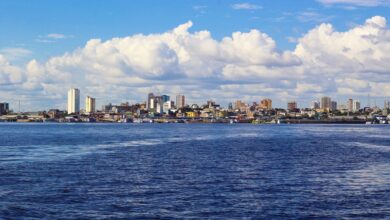Global Risks: “The Failure of Climate Change will be the Worst Risk in the Long Term”
According to the Global Risks organization, the cost of living represents the most latent problems for humanity in the next two years. However, the lack of adaptation to climate change would be the greatest threat for 2033. We tell you more about the greatest global risks.

Photo: Pixabay
LatinAmerican Post | Christopher Ramírez
Listen to this article
Leer en español: Riesgos globales: “El fracaso del cambio climático será el peor riesgo a larzo plazo”
On January 11th, a new "Global Risks Report" developed by the World Economic Forum (WEF) was released, in which it shows precisely what are the greatest threats that afflict the world at the beginning of this 2023.
Likewise, the document, which was carried out in collaboration with the firms Marsh McLennan and Zurich Insurance Group, showed what are the risks that could arise in the short term (two years) and the long term (ten years).
To begin with, it is important to remember that this report not only shows what experts on social, economic, technological, environmental and political issues think, but also the results of the Global Risk Perception Survey (GRPS), made by the WEF. That is to say, it is a compilation of opinions, arguments, and concerns that both analysts in each area and ordinary people show.
Short-term risks
In this sense, the document reports that it is conflicts such as the war in Europe and the geoeconomic tensions derived from it that have increased the problems present since the start of the COVID-19 pandemic.
“The near-term risk landscape is dominated by energy, food, debt, and disasters. Those who are currently most vulnerable are suffering, and in the face of multiple crises, those who qualify as vulnerable are increasing rapidly in rich and poor countries alike,” said Saadia Zahidi, WEF Director General.
For this organization, the cost of living (derived from energy, food and economic scarcity) is the concern on which attention must be focused throughout the planet. If the cost of living increases, the social, political and environmental problems will increase as well.
For example, in the case of Latin America, the report is clear when it explains that the cost of living crisis has resulted in social and political polarization, in which the promise of change gave way to the arrival of extremist ideas (especially of the left) to power in the region. This, according to the WEF, "may also further reduce the space for collective problem-solving to address global risks", not only in developing countries, but also in the world's powers.
"Electing less centrist leaders and adopting more 'extreme' policies in economic superpowers can fracture alliances, limit global collaboration and lead to more volatile dynamics," the report added.
We recommend you read: What Do Security And Climate Change Have To Do With Each Other?
On the other hand, there is also talk of the climate as a determining factor in the increase in the social and economic gap that Latin America is experiencing today. Indeed, "with 1.2 °C of warming in the system, the aggravating effect of a changing climate is already being felt, magnifying humanitarian challenges like food insecurity and adding another hefty bill to already stretched fiscal balance sheets," according to the WEF.
The last two years have been struck by “natural disasters and extreme weather events”, which, unfortunately, have disproportionately affected low- and middle-income countries around the world. “This situation was registered as one of the five main risks in 25 countries consulted by the Executive Opinion Survey (EOS) of the Forum, in particular in the developing coastal states of Latin America, Africa, and Southeast Asia”, dictates the document. .
Long-term risks
Now, what is considered for the moment as a short-term crisis can continue and result in a situation in which the cost of living will no longer be the main problem, but rather the environmental consequences that this would have entailed.
According to the Forum report, if business as usual, "climate and nature-related risks will lead the top 10 risks, by severity, that are expected to manifest over the next decade."
“Failure to mitigate climate change and failure to adapt to climate change top the ranking as the most serious risks globally, followed by natural disasters and extreme weather events and “biodiversity loss and ecosystem collapse,” indicates the document.
In a nutshell, the biggest concern 10 years from now would be to regret not having been able to mitigate the effects of climate change in the world; that is, accepting the fight for the protection of the planet as a defeat. As a consequence, the greatest risk is that people will also fail to adapt to what would be a new, less green and more threatening planet in 2033.
This is a reality that affects all regions of the world in almost the same way, although, of course, it brings greater economic risk to developing countries. These countries will see how the increase in debt and low investment capacity could lead to a social collapse in terms of infrastructure and public services to survive the environmental crisis.
“The ability to finance continued productivity and resilience will be hampered by economic and political dynamics both globally and nationally,” the WEF adds. In this way, "advanced economies will have more autonomy to invest in future priorities, while developing markets (such as Latin America) may be more indebted to creditor demands, which means that money could be diverted from areas of greatest social need, including spending on public goods and infrastructure”.
Seeing this situation, which more than a social imaginary is beginning to become a latent reality, is that the World Economic Forum concluded that although the risks present today should not be overlooked, it is important to start thinking about solutions that allow counteracting and even avoid the risks of tomorrow.
"A rigorous approach to foresight and preparation is required, as our goal is to strengthen our resilience to longer-term risks and chart a path to a more prosperous world," is the WEF's final message.




